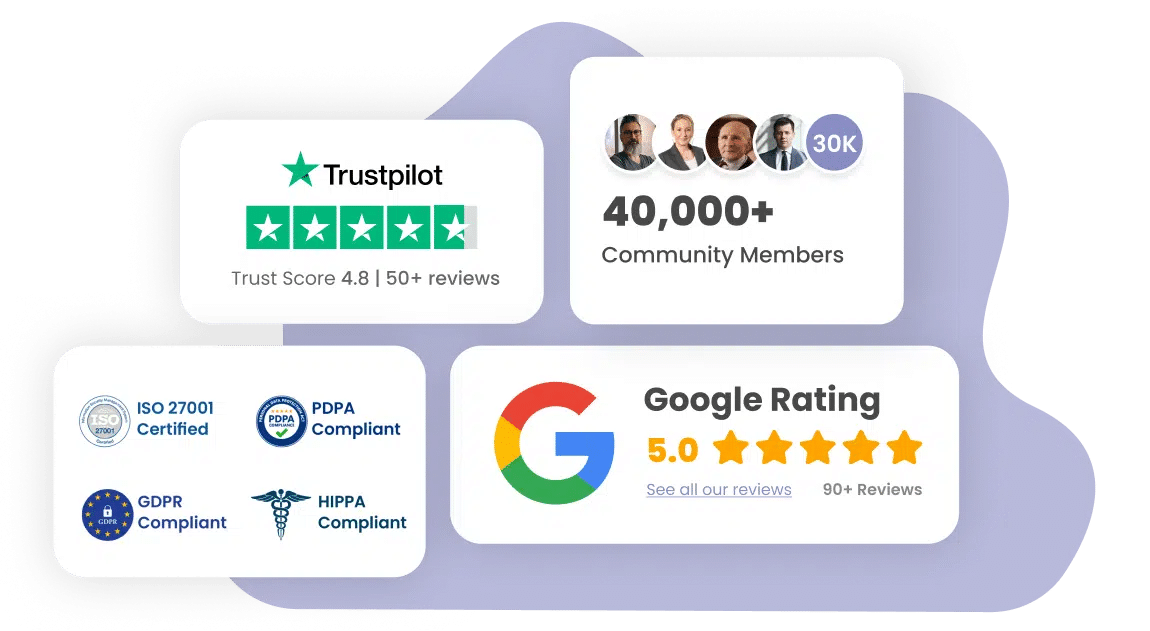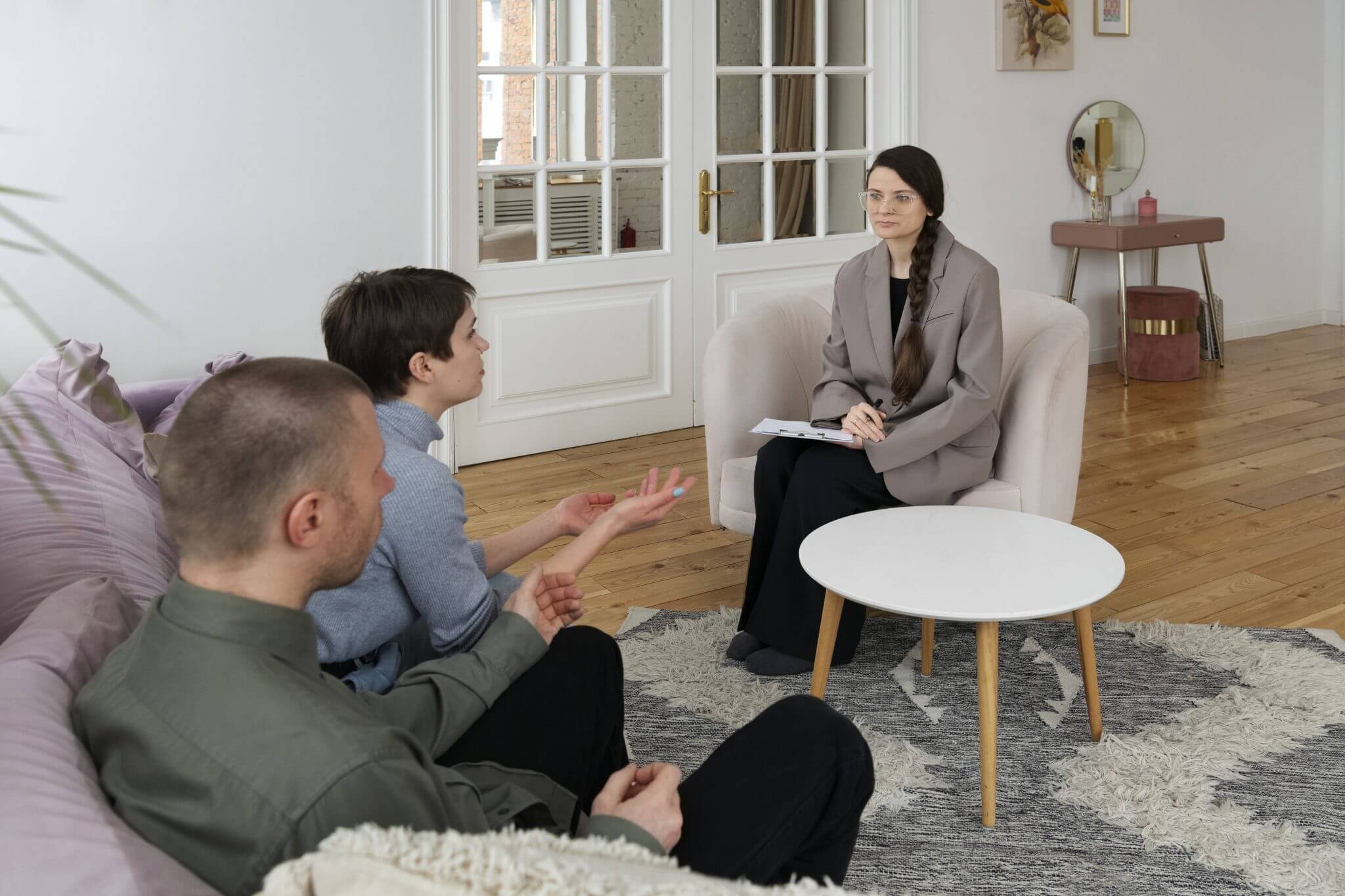Psychologists in Singapore
Find an affordable psychologist in Singapore
You are not alone in your journey. Connect with a psychologist in Singapore who understands and values your experiences.
- Expert team of Singaporean psychologists
- 98% of our psychologists would recommend TYHO
- Booking takes <1 minute on our platform
- Online & In-person sessions (several locations)
- Customised therapeutic plan
- Same-day, after-hours, & weekend sessions

Find Your Psychologist in Singapore
We urge you to look into the detailed profiles of each TYHO psychologist in Singapore. You can also refer to client testimonials before deciding.
We provide both online audio/video and in-person sessions. You can find your psychologist’s address in the blue box on their short profile if you prefer in-person sessions.

Alva
Psychologist
- TYHO Counselling Centre (City Hall)
Alva helps individuals and couples facing mood instability, trauma, relationship issues, Autism Spectrum Disorder (ASD), and Childhood Trauma / ACE.
Starting from S$ 174.40 (w/GST)

Aneel
Psychologist
- TYHO Room (Tanjong Pagar)
Aneel can work with individuals facing issues with anxiety (incl social anxiety), intergenerational trauma, financial stress, narcissism, and grief, separation & loss.
Starting from S$ 130.80 (w/GST)

Helen
Psychologist
- TYHO Counselling Centre (City Hall)
Helen can help individuals and couples with life transitions, anxiety (incl social anxiety), work-related stress or burnout, communication problems, and fears or phobias.
Starting from S$ 174.40 (w/GST)

June
Psychologist
June is able to work with individuals facing depression, anxiety, family relationships, trauma, and dementia.
Starting from S$ 174.40 (w/GST)
Psychologists in Singapore: Introduction
What does a psychologist do?
At TYHO, our psychologists’ primary goal is for clients to gain insights into their thoughts, behaviours, and emotions (eg they may provide insights on why you feel sad for no reason). Understanding why you do what you do and how you develop your personality traits will help you understand your problems, pursuits and relationships.
If you experience situational problems (eg health anxiety, conflicts in your workplace or relationships) or personal issues (like a lack of balance in eating, sleeping, or moving), you can seek help from a psychologist.
Best psychologists in Singapore also help with long-term conditions. Examples include depression, generalised anxiety, bipolar disorder, Attention Deficit Hyperactivity Disorder (ADHD), and trauma.
Our psychologists use evidence-based approaches such as Cognitive Behavioural Therapy (CBT), Acceptance and Commitment Therapy (ACT), and psychodynamic therapy to help you:
- Manage your mood
- Replace negative thought patterns
- Develop healthy ways to express your emotions
- Maintain meaningful relationships
- Overcome procrastination
There are many different forms of therapy, and psychologists adapt their approach to your needs and issues.
Online psychologists will also conduct research or psychological assessments to identify and diagnose any mental health disorders that you may have. Such assessments may include medical reports, school records, interview responses, etc.
TYHO clinical psychologists (a sub-group of psychologists specialising in psychopathology) can also conduct diagnostic tests (subject to the availability of tests).
Diagnostic tests include evaluations of your interpersonal skills, personality traits and cognitive abilities.
How do TYHO psychologists help during sessions?
How your sessions are structured depend on the specific issue you are facing, your online psychologist’s approach and their style of conducting sessions.
Please be assured that your therapy experience is our highest priority. We only work with qualified and open-minded professionals.
All TYHO private psychologists in Singapore have the required qualifications (minimum Master’s degree in counselling), relevant experience, and specialisations in their therapeutic practice. In addition, all psychologists are assessed for soft skills such as being non-judgmental and empathetic.
Moreover, you can easily find affordable psychologists in Singapore through our filters.
What should I tell my psychologist?
The first thing to remember is that there are no off-limit topics except for specific boundaries you agreed on with your psychologist.
A place to start is discussing your immediate emotions and worries. These feelings could include something that happened in the past hour or earlier in the week.
For example, you may have noticed:
- A pattern of avoiding food when you feel sad
- Poor sleeping patterns
- Racing and uncontrollable thoughts about your future or past (eg if you constantly think, “What is wrong with me?”)
- Distress while interacting with people in a social setting
- Dread when you think about work
- Fear of missing out on social events or work gatherings
You may also wish to bring up feelings that have been bugging you but which you can’t put a name to.
The best psychologist in Singapore can help you articulate your emotions and clarify them further.
How Can Psychologists Help You?
The issues a psychologist is equipped to help with can vary based on their training and individual specialisations.
As such, it is difficult to list all the issues an expert can help with, as different professionals are specialised in different issues. In general, however, some of the issues that TYHO psychologists are trained to help with include the following:
- Fears, anxiety, phobias
- Problems with eating (eg eating disorders including bulimia & anorexia)
- Stress and chronic pains
- Depression and low moods
- Compulsive or addictive behaviours
- Childhood trauma
- Learning disorders, behavioural challenges, academic and school stress
- Anger management
- Personal growth and self-awareness
- Family violence, abuse and post-traumatic stress disorder (PTSD)
During your first session with your psychologist, you may need help with how to proceed. You may also need clarification on whether your psychologist fits you well or whether they can offer you the support you want.
Given that the therapeutic journey takes several months or even years, depending on the issues troubling you, it is important to address these questions.
Some questions that you may want to ask your psychologist are as follows:
- How long have they been practising?
- Have they seen clients with circumstances similar to yours, and if yes, how many and how long ago?
- What is their general approach as a psychologist when helping clients work through issues?
- How many sessions do they anticipate that you might need before you see improvement?
- What do they consider to be relevant when creating counselling goals?
- How often do they have peer consultations?
While your psychologist may undoubtedly have their own opinions and beliefs, mental health professionals, including psychologists, avoid providing advice.
A key idea that psychologists believe is that you are the expert on your life experiences. Hence, the goal is to understand what motivates you and how to make better decisions with guidance and professional support.
TYHO psychologists avoid providing a ‘quick’ solution, as it usually decreases a person’s trust in themselves. Direct solutions would also incorrectly imply that the psychologist knows your life better than you do.
To avoid invalidating you, psychologists use various therapeutic techniques to help you gain self-awareness. They also provide tools to cope with life’s challenges, and improve your overall mental and physical well-being.
Doing so would involve you working together with your psychologist. Together, you will explore different perspectives, identify patterns in thoughts and behaviours, learn new skills to be more confident and assertive and connect with your past experiences.
That said, your psychologist might offer guidance or suggestions based on their professional expertise, especially when managing mental health conditions, stress, depression, or life transitions.
But this isn’t ‘advice’ in the conventional sense; it’s more about providing evidence-based strategies for managing psychological challenges.
Remember, each therapeutic relationship is unique, and the exact approach can depend on the psychologist’s style, your specific needs, and the nature of the issue you’re dealing with.

What to Expect at the Psychologist
Going to your first psychology appointment might be scary and overwhelming. You are not alone in this experience. Many people feel anxious before starting a meeting with a psychologist because they may not know what to expect.
Hence, in this section, we will discuss what to expect from offline and online psychologists at TYHO. This guide will help you:
- Ease your nervousness around uncertainty
- Provide you with invaluable information to improve your experience with us
- Prepare you for your first few psychologist sessions

Initially, we will help you book a session with an affordable psychologist in Singapore.
The first session you have with your psychologist will involve breaking the ice.
Your psychologist will have a relaxed conversation with you and try to get to know you better. You can take this opportunity to ask them questions about their experiences, style of work, feedback, therapeutic approaches, and about their general outlook in life.
Some of the questions psychologists ask include your medical history, mental health history, your employment/academic growth, how you have been feeling the past few days, and your reasons for seeking help.
Try to be as honest as possible. The more you share with your psychologist, the easier it is for them to tailor their approach to your needs.
However, being vulnerable with a psychologist can be daunting due to reasons such as mental health stigma, misconceptions about psychologists, and anxiety about uncertainty. Be gentle with yourself, as it may take some time to open up.
Some of the areas of life you can discuss in the first few sessions can include:
- A bit about your past or current relationships
- Overview of your emotional struggles, such as feeling low or upset all the time
- Your short and long-term goals in life and your mental health journey
After your first session, TYHO private psychologists might conduct a psychological assessment. Although it might sound intense, assessments are simply a more structured tool to understand you as a person.
Psychological assessments may include questionnaires or therapeutic activities like mood tracking or self-awareness questions.
Most personality tests include open-ended questions and introspective self-reports along with rating scales.
The psychologist will then use the filled-out form to learn more about your feelings, how you react when you are sad, upset, or angry, and how you solve problems in life.
Psychologists in Singapore may also use assessments to diagnose mental health conditions such as Attention Deficit Hyperactivity Disorder (ADHD), Obsessive Compulsive Disorder (OCD), Generalised Anxiety Disorder (GAD), etc.
If you are looking for a psychological assessment, please contact the TYHO Corporate team before booking a session with a psychologist.
Healing is complex, unique, and non-linear. During psychologist sessions, you will begin to talk about your problems. There are no restrictions to what you can or cannot say to your private psychologist.
For example, you can talk about how you can't sleep at night, overeat when upset, cannot express your thoughts and feelings to your partner, have interpersonal conflicts, or constantly feel like life has no meaning or purpose.
During sessions, you can expect a lot of talking and exchanging thoughts, active listening from your psychologist, and a genuine interest in your story. The best psychologist in Singapore will help you:
- Explore healthy ways to express your emotions (eg through art, music, and writing)
- Learn skills to become assertive and improve your communication skills
- Clarify your values, belief systems and thoughts
- Explore your past experiences in life, including your childhood, and how they may have affected you
Sharing your most private and vulnerable incidents may not be comfortable, but remember that you are in a non-judgmental space.
Discomfort is a common experience in sessions, but it’s definitely also a part of the healing process.
Talking to an affordable psychologist in Singapore is not a quick fix – it's a journey. Over time, you will begin to observe changes in how you think, feel, and react to situations or people.
The progress might be slow or fast, but the most important point to remember is that every session and every small change you notice in yourself contributes to improving your mental and physical well-being.
After several sessions with your psychologist, you may start to reach your goals and may even set new ones. TYHO psychologists value their clients above everything else, and they will celebrate your milestones along with you.
Hopefully, you now have a clearer idea of what you can expect from the psychologist. Please note that the above points may or may not happen in the exact order.
Sometimes, psychologists may conduct assessments in the first session, or you may even want to talk about personal things immediately. All that is okay and expected. There are no set rules or orders about what to share first.
Your experience may differ from others because every person, every situation, and every session is unique. The beauty of mental health support is also the personalisation involved in tailoring solutions for each individual based on their needs and preferences.
In general, however, the benefits you can expect are:
- Increased confidence and self-esteem
- Using healthy coping mechanisms to express yourself
- Improved skills to manage conflicts in relationships
- Improved your self-awareness and unlearning harmful habits
- Improved mental resilience
Please be assured that TYHO psychologists will be with you every step of the way.
Frequently Asked Questions
Yes, you can! TYHO online psychologists who provide online sessions connect with their clients via audio or videoconferencing.
Videoconferencing, in particular, allows online psychologists to perform psychological assessments or tests on their clients, as they can read their clients’ facial expressions and body language in real time despite not interacting with them in person.
You can choose a modality based on your comfort level. After a few sessions, if you wish to change your preferences, that is okay. You can communicate with your psychologist regarding your needs and preferences!
People practising as psychologists are not currently regulated in Singapore.
Nonetheless, according to the Ministry of Health (Singapore), professional bodies such as the Singapore Association for Counselling (SAC) and Singapore Psychological Society (SPS) guide its members’ professional and ethical conduct.
At the moment, registration with these bodies is not mandatory. However, almost all TYHO psychologists and other professionals are either registered with or are awaiting registration with SAC and SPS.
While the best psychologists in Singapore can diagnose psychological conditions and offer sessions, it should be noted that psychologists do not prescribe medication.
Most psychologists do not attend medical school and are not trained to provide prescriptions.
If you require medication, a psychologist may refer you to a psychiatrist.
General psychologists (or counselling psychologists) and clinical psychologists share much in common.
At TYHO, both clinical and counselling psychologists aim to help you work through your emotional difficulties, such as anger management and unhelpful behaviours like excessive shopping or drinking, to cope with emotions.
Both types of psychologists may also use similar therapeutic methodologies and conduct psychotherapy during their sessions.
The main difference between the two types essentially comes down to severity. On one hand, clinical psychologists tend to focus more on managing issues faced by individuals with severe psychological conditions or illnesses.
On the other hand, counselling psychologists work with clients facing various life stressors arising from interpersonal conflicts, academic pressure or expectations, work or financial stress, family or generational trauma, or mild mood disorders.
Of course, often, there is a significant overlap between the issues that clinical psychologists and counselling psychologists help with.
Therefore, choosing a specific type of professional on our platform does not make a significant difference.
Instead, we encourage clients to consider whether their preferred psychologist will be a good fit for them on the basis of the psychologist’s background, specialisation and approach to counselling.
A good place to start is to check if your psychologist is licensed. While there’s no mandatory licensing regime in Singapore, the Singapore Register of Psychologists maintains an official register of recognised psychologists.
However, as registration is not mandatory, despite the legitimate credentials held by your psychologist, their name may not be found on the register.
Please note that most TYHO psychologists in Singapore are registered with the Singapore Psychological Society.
You may also want to find a psychologist who is a good fit for you. A key determinant is your comfort level with your psychologist and whether you feel at ease around them.
You can initially book a session with a shortlisted psychologist and try working with them for 3 to 4 sessions to gauge your feelings.
After a few sessions, if you want to change your psychologist, please feel free to do so. Finding the best psychologist in Singapore will take time, and you should give yourself the chance and time to find someone who understands you.
Some signs that your psychologist may be a good match for you are:
- You feel validated and listened to
- You trust them and view them as an ally
- You have noticed changes in yourself for the better
- Your psychologist offers a range of possible solutions and is willing to provide suggestions if the current treatment does not work out for you
- Your psychologist provides you with the tools you need to adopt better habits
Figuring out that your psychologist has ill intentions can be confusing, especially if you are new to therapy and do not know what to look for.
As a guideline, in Singapore, the Singapore Register of Psychologists has a Code of Ethics for psychologists practising in Singapore.
You can explore the full code of ethics, but in general, some of the principles are as follows:
- Your psychologist should give you proper respect. This means being respectful of your values, attitudes and beliefs. Your psychologist should not be attempting to impose their values on you.
- Your psychologist should always work for your benefit. They should consider the potential of their actions to impact your life positively and work with that in mind.
- Your psychologist should maintain confidentiality where possible. Barring legal and ethical interventions, your psychologist should protect your personal information from being leaked. They should also seek your consent before recording or using any personal information.
- Your psychologist should not discriminate against you based on race, religion, gender, or sexual orientation.
- Your psychologist should also not harass, exploit or engage in an intimate/romantic relationship with you.
If you feel threatened during sessions or find that they may have violated some of these principles, raise them with your psychologist.
Please also reach out to us via email at [email protected] if you need help or assistance.
At TYHO, we require at least a relevant Master’s degree, training, and experience in therapeutic approaches to provide psychological services.
Yes, psychologists can use diagnostic tests to diagnose mental health illnesses and disorders.
There are several routes you can take to consult an affordable psychologist free of cost or at a low price, including:
- Your company’s Employee Assistance Program. Check to see if you can consult a psychologist at your company’s cost. TYHO is an EAP provider and is listed with the Ministry of Manpower in Singapore.
- Your insurance coverage. Check to see if it includes mental health support.
- Your religious organisation. Check if your place of worship provides mental health support. Many churches and other religious organisations offer free sessions, including non-religious support.
- Your school or university. If you are a student, your school or university may provide free or low-cost options.
- Not-for-profit organisations. Check if they provide free or low-cost sessions with affordable psychologists.
Other Related Services
In addition to psychological services, we offer several other services to support people of all ages and from diverse backgrounds.
In the section below, you will find more information about the mental health issues we help with and our related services. Click on the link of each service to read more!
Related Pages
Uncertain about seeing a psychologist now?
That’s perfectly fine! You’re warmly invited to become a part of our community at TYHO.
We aim to provide a welcoming environment where you can freely discover all aspects of your inner world.
As you take this important decision at your own pace, we encourage you to engage with our community. We offer insightful blog posts, free resources, and interactive events to enlighten, entertain, and inspire.














